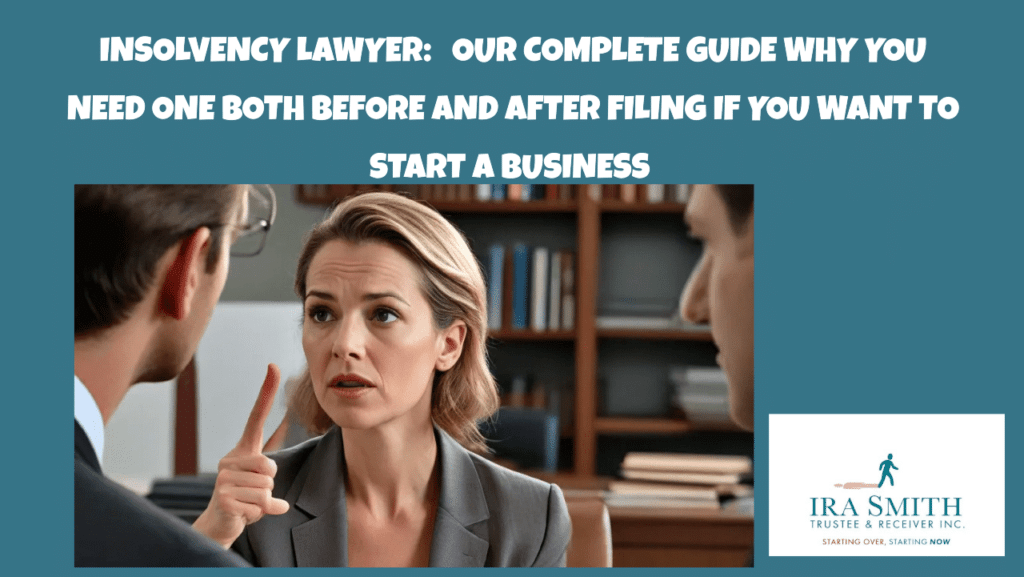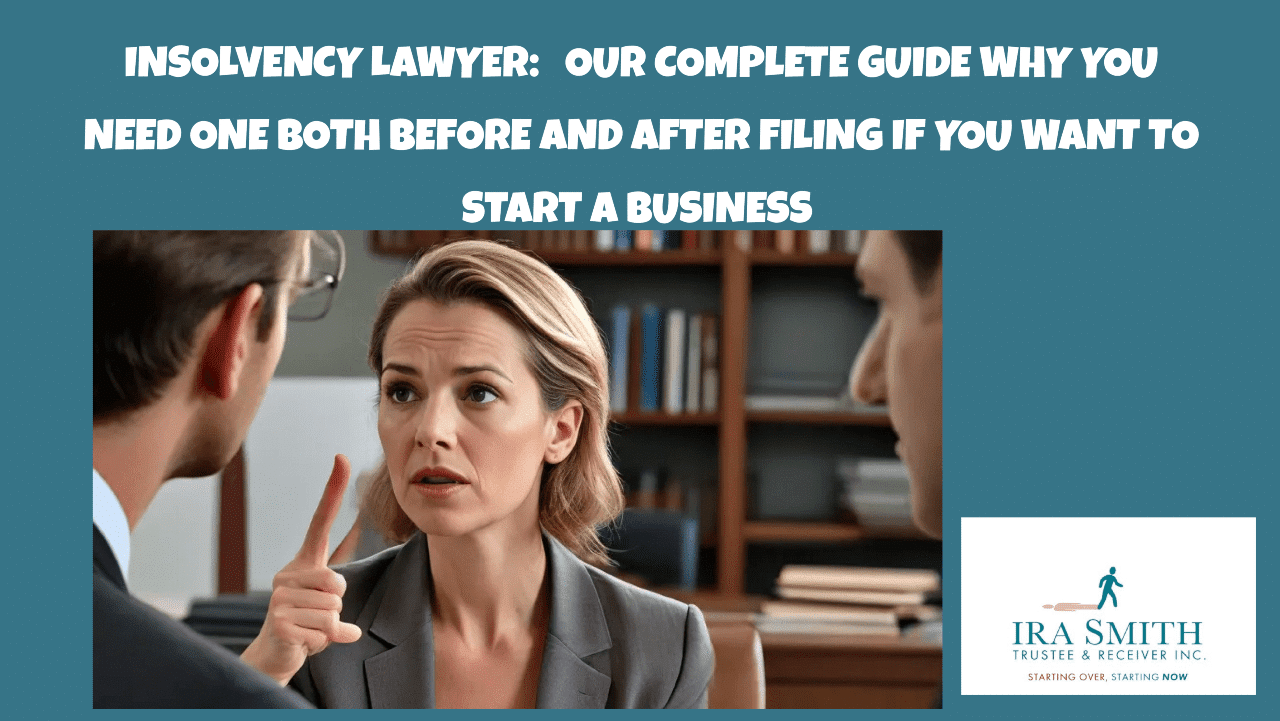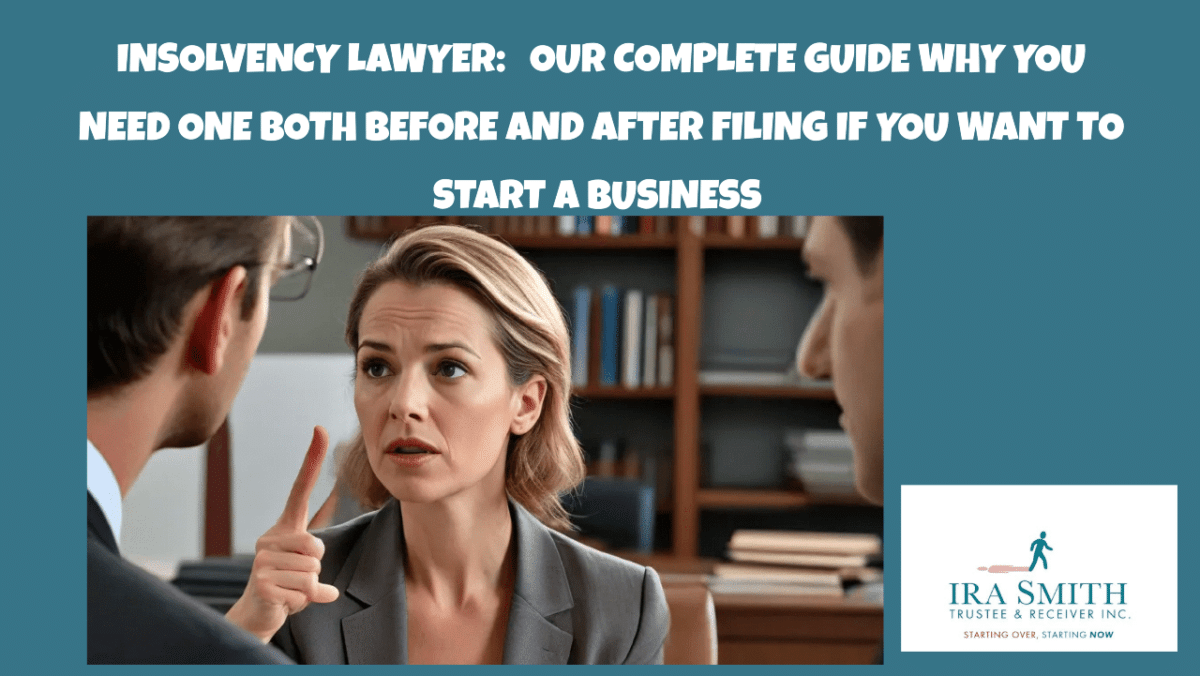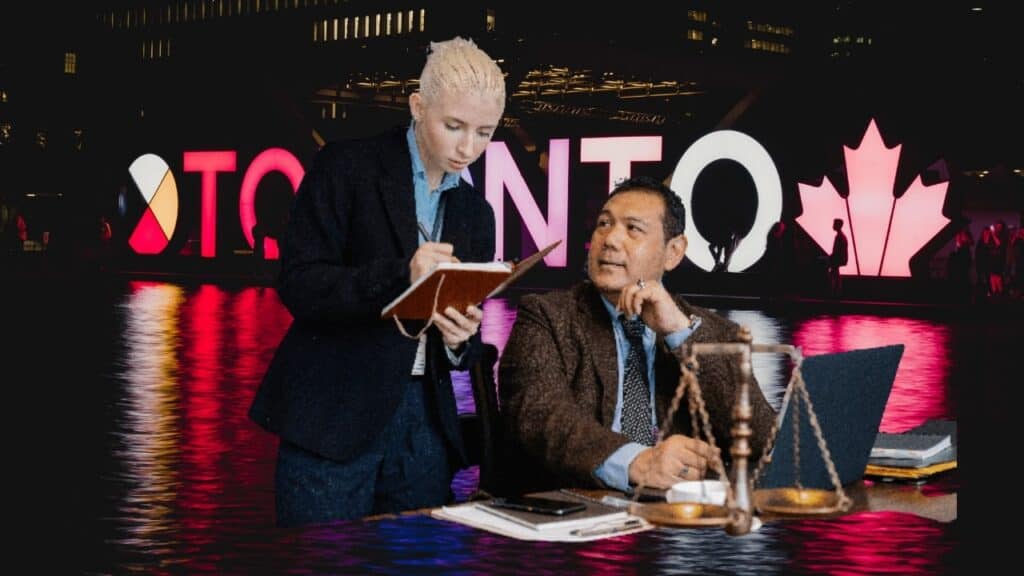Insolvency lawyer introduction
So you’ve been through a tough time with debt, and you’re thinking about starting a business? Well, the goal of the Canadian insolvency system is to allow people in financial distress to bounce back, even after dealing with bankruptcy or a consumer proposal.
In this Brandon’s Blog, I discuss why you need to hire an insolvency lawyer:
- if you are in business and need to file for bankruptcy; or
- if you need to file bankruptcy and then wish to start a business.
The time to hire the insolvency lawyer is before you do a bankruptcy filing. First, let us go over a few basic definitions.
Insolvency Lawyer: Bankruptcy and Insolvency in Canada
Here are a few basic definitions you need to know about the Canadian insolvency process.
Bankruptcy: This is like a fresh start where you get rid of most if not all of your unsecured debts. It’s sometimes called “straight bankruptcy,” or a “bankruptcy liquidation” where a licensed insolvency trustee (formerly called a bankruptcy trustee) is appointed to sell most of your assets to pay back the people you owe money to.
But, if the only assets you own are those that are exempt from seizure, called exempt assets, then there aren’t any assets to sell. In that event, the case is closed without taking any assets. You can usually keep basic stuff like your clothes and a reasonably priced car. You can also keep most of your RRSP – you only lose the contributions made within the 12 months before filing bankruptcy.
Consumer Proposal: This is a way to reorganize your debt and make a deal with your creditors. Instead of getting rid of everything, you agree to a payment plan, usually lasting three to five years, to pay back some of what you owe. This way you get to keep your assets and once you make all the payments you promised to make to the licensed insolvency trustee, the rest is written off by your unsecured creditors.
In Canada, many people who own businesses operate as sole proprietors, meaning that legally, your personal finances and your business finances are connected. This means that if you file for bankruptcy or a consumer proposal, it will affect both your personal and business finances. If your business is set up as a separate legal entity as a corporation, this might not be the case, and you might have more flexibility.
Understanding the Role of Insolvency Lawyers
Insolvency lawyers help people and companies navigate the tricky world of debt and bankruptcy. Here’s a breakdown of what they do:
Advising on Bankruptcy Alternatives
Insolvency lawyers explore all the options before jumping into bankruptcy. They might suggest things like debt restructuring or repayment plans. For example, they could help a business negotiate with its creditors to lower payments or give them more time to pay.•
Debt Restructuring Guidance◦
Sometimes, instead of declaring bankruptcy, you can reorganise your debts. This means making a plan to pay back what you owe in a way that’s more manageable. Insolvency lawyers help create these plans, making sure they’re fair for everyone involved. They’ll work to find solutions so that businesses can continue operating while repaying debts.•
Advocacy in Insolvency Proceedings◦
If bankruptcy is the only option, insolvency lawyers act as your advocates in court. They help you understand the bankruptcy process and represent you in court. They make sure your rights are protected.
For individuals, it means helping them keep essential property while dealing with debt.
Why is this important? Bankruptcy and insolvency can be super stressful. Insolvency lawyers can guide you through the process and help you make the best decisions for your future. They can explain complex stuff like bankruptcy and consumer proposals. They can also provide guidance that can help a business owner keep their business operating.
Bottom line: Insolvency lawyers provide essential support to individuals and businesses facing financial difficulties. They offer expert advice, help navigate complex legal processes and situations, and advocate for their clients’ best interests. All of this is done with lawyer-client privilege intact.
Difference Between Insolvency Lawyers and Licensed Insolvency Trustees
Let’s break down the roles of two key players when dealing with debt: Insolvency Lawyers and Licensed Insolvency Trustees. They both help when you’re facing financial difficulties, but they do it in different ways. Think of it like this: one is like a legal guide, and the other is like a financial manager.
What’s the difference? It’s all about their roles and responsibilities in the insolvency process.
Licensed Insolvency Trustees
LITs are licensed and regulated by the Canadian government. They are the only insolvency professionals in Canada legally authorised to administer bankruptcies and proposals to creditors.
Financial Managers: Think of them as financial managers who oversee the insolvency process. They assess your financial situation, explain your options by giving you practical advice (like bankruptcy or a consumer proposal), and administer the process that you decide to file.
Key Responsibilities: This includes managing your assets, dealing with creditors, and making sure everything follows the rules of the Bankruptcy and Insolvency Act.
Insolvency Lawyers
Insolvency lawyers are legal professionals who understand insolvency laws and specialise in providing insolvency legal services.
Legal Guides/Advocates: They provide legal advice and represent you in court if needed. They ensure your rights are protected throughout the insolvency process.
Key Responsibilities: This includes advising you on your legal options, helping you choose the best course of action, negotiating with creditors, and representing you in legal proceedings.
Here’s a table to simplify it:
Feature | Licensed Insolvency Trustee | Insolvency Lawyer |
Role | Administrator/Financial Manager | Legal Advisor/Advocate |
Licensing | Licensed and regulated by the Canadian government through the Office of the Superintendent of Bankruptcy. | Licensed lawyer |
Key Functions | Administers bankruptcy and proposal processes, manages assets, deals with creditors. | Provides legal advice, negotiates with creditors, represents you in court. |
Focus | Managing the financial process of insolvency. | Providing legal guidance and protecting your rights. |
When to engage | When considering bankruptcy or a consumer proposal. | When you need legal advice, are facing legal action from creditors, or want to explore all your options before filing. |
Can they offer advice? | Trustees can explain the implications of the available debt relief options, including bankruptcy, but they must remain impartial. | Insolvency lawyers can provide legal counsel and advocate on your behalf. |
Why is this important? Knowing the difference helps you get the right kind of help when you need it. If you’re just starting to explore your options, a Trustee can give you an overview. If you need someone to fight for your rights or provide legal advice, a lawyer is the way to go. Sometimes, you might even need both!
Real-World Example: Imagine a small business owner in Toronto is drowning in debt. They might start by talking to a Licensed Insolvency Trustee to understand their options for filing a proposal or bankruptcy. If they are facing lawsuits that if successful, the type of debt would not be discharged by a bankruptcy, they need an insolvency lawyer to fight it. The person may also need advice on how their business could continue if they need to file for bankruptcy. Finally, they might need to hire an insolvency lawyer to represent them in bankruptcy court.
Bottom line: Trustees manage the process of insolvency, while insolvency lawyers provide legal guidance and advocacy. Both play crucial roles in helping individuals and businesses navigate financial difficulties in Canada.
Insolvency Lawyer: Can You Really Start a Business After Bankruptcy?
Absolutely! According to an insolvency lawyer, it doesn’t prevent you from starting a business. However, it might be more challenging to get funding and handle the money side of things when starting up, and that’s true for anyone starting a business. Financial institutions are not going to fund a business run by an undischarged bankrupt!
In addition to how you are going to fund a new business while being an undischarged bankrupt, you also have to think of things like how will your business be formed, i.e. a sole proprietorship or a corporation. If a corporation, who is going to be the director and who is going to be the shareholder. As an undischarged bankrupt, you cannot be a director and you do not want to be the shareholder.
Bankruptcy will show up on your personal credit report for up to 7 years from the date of filing. If your business files for bankruptcy it could stay on your business credit report for much longer.
But, keep in mind that many people who file for bankruptcy have probably already seen their credit scores drop due to debt, missed payments, and so on. So, bankruptcy can actually be a way to reset your finances and start rebuilding your credit and, potentially, launch a new business.
As you can see, going bankrupt and then starting a business can be a very tricky endeavour. There are many legal issues to consider and get advice on given your financial situation. That is why if you are contemplating filing bankruptcy and then wish to start a business, you need to speak to an insolvency lawyer before doing anything.
What Happens If You Have a Business When You File for Bankruptcy?
If you’re a sole proprietor and file for bankruptcy, the licensed insolvency trustee is entitled to take control of your business assets. The Trustee will value the assets and sell them. It is unlikely that the Trustee will operate your sole proprietorship.
If you have a company, the business isn’t automatically dragged into your personal bankruptcy. The Trustee gets ownership of the shares you hold in the corporation, which may have no value for creditors. However, as stated above, an undischarged bankrupt person cannot continue to act as a director of a corporation.
Things to Consider When Star ing a Business After Bankruptcy or a Consumer Proposal
Separate Legal Entities: Consider forming a corporation to legally separate your personal and business finances. This means that your business’s problems won’t automatically drag down your personal finances and vice versa. If the business is separate from you, your bankruptcy does not automatically mean that the business has to close.
Money Matters: Create a detailed financial plan with a realistic budget. Be careful with taking on expensive debt. It’s important to focus on the cost of credit, not just the minimum payment.
Business Partners: Choose your business partners very carefully, as their actions could impact your finances. Make sure you have a written agreement in place for your business relationships and consider that your partner’s credit can impact your ability to get loans.
Types of Business Bankruptcy in Canada
Bankruptcy (Liquidation): If you have a business and have to file for bankruptcy, it usually means the business will shut down. For a proprietorship, a Trustee will sell the business assets as well as any non-exempt personal assets not used in the business. If the business is in a corporation, then the shares owned by the bankrupt person will need to be valued and sold by the Trustee.
Reorganization: If a business wants to keep operating, it can work out a deal with its creditors to repay debts while it continues operating. This would be done through a commercial proposal.
Important point: If you’re a sole proprietor, the business and you are legally seen as one and the same. This makes a reorganization type of bankruptcy easier since you are treated as a person, not a business.
How to Start Rebuilding Credit
Get accounts that report to credit bureaus: You want to have accounts that will show up on your credit reports.
Pay on time: Make sure you pay all of your bills on time.
Keep debt low: Try to keep your borrowing low.
Credit-Building Tools
Secured Credit Cards: These require a deposit, and it’s returned to you when you close the account. They are easier to get with bad credit.
Net-30 Accounts: Some suppliers allow you to pay in 30 days, and they report the payments to credit bureaus.
Keep an eye on your credit reports: This will allow you to track your credit building progress.
Insolvency Lawyer Conclusion
I hope you enjoyed this insolvency lawyer Brandon’s Blog. Do you or your company have too much debt? Are you or your company in need of financial restructuring? The financial restructuring process is complex. The Ira Smith Team understands how to do a complex restructuring. However, more importantly, we understand the needs of the entrepreneur or someone with too much personal debt.
You are worried because you are facing significant financial challenges. It is not your fault that you are in this situation. You have been only shown the old ways that do not work anymore. The Ira Smith Team uses new modern debt relief options to get you out of your debt troubles while avoiding the bankruptcy process. We can get you debt relief freedom using processes that are a bankruptcy alternative.
The stress placed upon you is huge. We understand your pain points. We look at your entire situation and devise a strategy that is as unique as you and your problems; financial and emotional. The way we take the load off of your shoulders and devise a plan, we know that we can help you.
We know that people facing financial problems need a realistic lifeline. There is no “one solution fits all” approach with the Ira Smith Team.
That is why we can develop a restructuring process as unique as the financial problems and pain you are facing. If any of this sounds familiar to you and you are serious about finding a solution, contact the Ira Smith Trustee & Receiver Inc. team today.
Call us now for a free consultation. We will get you or your company back on the road to healthy stress-free operations and recover from the pain points in your life, Starting Over, Starting Now.
The information provided in this Brandon’s Blog is intended for educational purposes only. It is not intended to constitute legal, financial, or professional advice. Readers are encouraged to seek professional advice regarding their specific situations. The content of this Brandon’s Blog should not be relied upon as a substitute for professional guidance or consultation. The author, Ira Smith Trustee & Receiver Inc. as well as any contributors to this Brandon’s Blog, do not assume any liability for any loss or damage.



